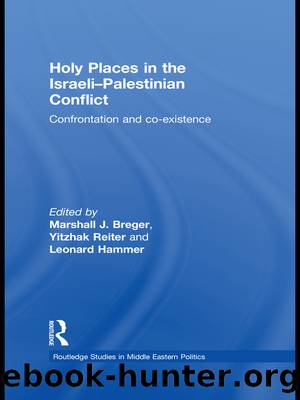Holy Places in the Israeli-Palestinian Conflict by Breger Marshall J.;Reiter Yitzhak;Hammer Leonard;

Author:Breger, Marshall J.;Reiter, Yitzhak;Hammer, Leonard;
Language: eng
Format: epub
Tags: Humanities
Publisher: Taylor & Francis Group
Published: 2009-11-11T00:00:00+00:00
Recipes for disaster
In facing these seemingly intractable challenges, peacemakers have suggested a variety of approaches for managing coexistence at sacred sites. Their tools tend to fall into three broad categories: partition, scheduling, and exclusion. In the JewishâMuslim and HinduâMuslim disputes that I examine below, these strategies provide temporary solutions, at best. Instead of resolving disputes, they provide provisional accommodation in the hope that gradual understanding between the rival groups will displace tensions. Instead, such provisions merely serve to frustrate religious movements which find their access to a sacred site restricted by the presence of rivals. This frustration is made all the more acute by each groupâs perception that divine decree has granted it, and only it, exclusive rights to the site. As the rivals face off in a zero-sum conflict, their resentment tends to manifest itself, sooner or later, in a violent outburst.12
In the first conflict resolution approach, the sacred space is divided so as to permit two or more religious groups to worship at a sacred site at the same time. This can take the form of establishing restrictions on access to specific parts of a shrine or indicating spheres of jurisdiction without restricting access. The former is the approach adopted in several Indian mosques that have been constructed on top of, and with materials recycled from, destroyed Hindu temples. At the Krishna Janmasthan in Mathura, the Kashi Vishwanath Temple/Gyanvapi Mosque in Varanasi and the Quwwat-ul-Islam Mosque in Delhi, Hindu and Muslim worshipers pray in distinct areas, separated by barriers and guarded by Indian military troops.13 The latter approach, jurisdictional division, was implemented in the Church of the Holy Sepulcher in Jerusalem and the Church of the Nativity in Bethlehem, where members of the different Christian sects are free to move about the shrine but are limited in their right to clean, maintain or decorate sectors other than their own.
In the second scenario, a detailed agreement establishes the times at which different groups have access to a site. Such an agreement might permit only one group to access the site at one time or establish periods of common versus separate worship. In most cases, division and scheduling are combined. In the Church of the Holy Sepulcher, for example, parts that are in the public domain most of the year are reserved for the exclusive use of one sect or another at dates of particular significance to that sect. Scheduling need not provide equal access to all parties involved. Only Muslims are permitted to access the Temple Mount platform in Jerusalem on Fridays and Muslim holy days; non-Muslims are permitted there at other times but may not pray there.
Finally, the strategy of exclusion seeks to resolve conflict over a sacred site by barring all religious groups from worshiping there. This can be achieved by secularizing the sacred place, conferring historical or archeological status on the site or simply locking its gates to worshipers. For example, the Hagia Sophia in Istanbul, a church converted into a mosque, could have formed the
Download
This site does not store any files on its server. We only index and link to content provided by other sites. Please contact the content providers to delete copyright contents if any and email us, we'll remove relevant links or contents immediately.
| Bahrain | Egypt |
| Iran | Iraq |
| Israel & Palestine | Jordan |
| Kuwait | Lebanon |
| Oman | Qatar |
| Saudi Arabia | Syria |
| Turkey | United Arab Emirates |
| Yemen |
Empire of the Sikhs by Patwant Singh(22763)
The Wind in My Hair by Masih Alinejad(4839)
The Templars by Dan Jones(4557)
Rise and Kill First by Ronen Bergman(4545)
The Rape of Nanking by Iris Chang(4022)
12 Strong by Doug Stanton(3419)
Blood and Sand by Alex Von Tunzelmann(3055)
The History of Jihad: From Muhammad to ISIS by Spencer Robert(2504)
Babylon's Ark by Lawrence Anthony(2428)
The Turkish Psychedelic Explosion by Daniel Spicer(2245)
No Room for Small Dreams by Shimon Peres(2235)
Gideon's Spies: The Secret History of the Mossad by Gordon Thomas(2231)
Inside the Middle East by Avi Melamed(2230)
Arabs by Eugene Rogan(2193)
The First Muslim The Story of Muhammad by Lesley Hazleton(2154)
Bus on Jaffa Road by Mike Kelly(2035)
Come, Tell Me How You Live by Mallowan Agatha Christie(2025)
Kabul 1841-42: Battle Story by Edmund Yorke(1921)
1453 by Roger Crowley(1879)
